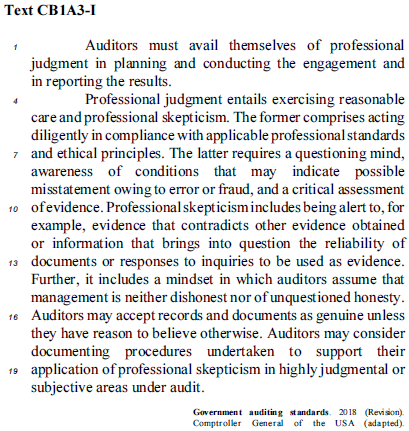‘Emily in Paris’ star says he partly understands why critics panned the ‘cliché’ Netflix show
Despite being a huge hit for Netflix, critics across the board (particularly French critics) have slammed the show for indulging in outdated and offensive stereotypes that present Parisians as rude, sexist, and elitist.
The main love interest in Netflix’s controversial comedy “Emily in Paris” said he partly understands why critics have panned the show. “I think they’re right in a way,” Lucas Bravo, who plays chef Gabriel in the show, said during an interview with Cosmopolitan.
The 32-year-old French actor continued: “At some point, if you want to tell a story about Paris, you have to choose an angle. You have to choose a vision. French critics, they didn’t understand the fact that it’s just one vision. They’re like, ‘Oh, this is not what Paris is.’ Of course. Paris is many things.”
Adapted from https://www.insider.com/emily-in-paris-star-lucas-bravounderstands-netflix-show-criticism-2020-10.
The word “panned”, in bold in the text, could NOT be replaced by:
The sentence “Students are really the key piece to it.” (paragraph 3) can be correctly paraphrased in the following terms:
How facial recognition technology aids police

Police officers’ ability to recognize and locate individuals with a history of committing crime is vital to their work. In fact, it is so important that officers believe possessing it is fundamental to the craft of effective street policing, crime prevention and investigation. However, with the total police workforce falling by almost 20 percent since 2010 and recorded crime rising, police forces are turning to new technological solutions to help enhance their capability and capacity to monitor and track individuals about whom they have concerns.
One such technology is Automated Facial Recognition (known as AFR). This works by analyzing key facial features, generating a mathematical representation of them, and then comparing them against known faces in a database, to determine possible matches. While a number of UK and international police forces have been enthusiastically exploring the potential of AFR, some groups have spoken about its legal and ethical status. They are concerned that the technology significantly extends the reach and depth of surveillance by the state.
Until now, however, there has been no robust evidence about what AFR systems can and cannot deliver for policing. Although AFR has become increasingly familiar to the public through its use at airports to help manage passport checks, the environment in such settings is quite controlled. Applying similar procedures to street policing is far more complex. Individuals on the street will be moving and may not look directly towards the camera. Levels of lighting change, too, and the system will have to cope with the vagaries of the British weather.
[…]
As with all innovative policing technologies there are important legal and ethical concerns and issues that still need to be considered. But in order for these to be meaningfully debated and assessed by citizens, regulators and law-makers, we need a detailed understanding of precisely what the technology can realistically accomplish. Sound evidence, rather than references to science fiction technology --- as seen in films such as Minority Report --- is essential.
With this in mind, one of our conclusions is that in terms of describing how AFR is being applied in policing currently, it is more accurate to think of it as “assisted facial recognition,” as opposed to a fully automated system. Unlike border control functions -- where the facial recognition is more of an automated system -- when supporting street policing, the algorithm is not deciding whether there is a match between a person and what is stored in the database. Rather, the system makes suggestions to a police operator about possible similarities. It is then down to the operator to confirm or refute them.
By Bethan Davies, Andrew Dawson, Martin Innes (Source: https://gcn.com/articles/2018/11/30/facial-recognitionpolicing.aspx, accessed May 30th, 2020)
The word “while” in “While a number of UK and international police forces have been enthusiastically exploring the potential of AFR” has the same meaning as
The body of officers representing the civil authority of government is known as police. Police typically are responsible
for maintaining public order and safety, enforcing the law, and preventing, detecting, and investigating criminal activities. These
functions are known as policing. Police are often also entrusted with various licensing and regulatory activities. However, police
scholars have criticized this popular understanding of the word “police” — that it refers to members of a public organization
having the legal competence to maintain order and enforce the law — for two reasons. First, it defines police by their ends rather
than by the specific means that they use to achieve their goals. Second, the variety of situations in which police are asked to intervene is much greater than law enforcement and order maintenance.
There is now a consensus among researchers that the common feature among all the different agencies engaged in policing is the legal competence to enforce coercive, nonnegotiable measures to resolve problematic situations. Such situations are characterized by their potential for harm and the need to solve them urgently before they develop that potential. Hence, the actual use of coercion or the threat of using it allows police to put a quick, nonnegotiated, and conclusive end to problematic situations.
Internet: <www.britannica.com> (adapted)
Based on the text above, judge the following item.
In the last sentence of the second paragraph, the word “actual” means present.
According to Paolo, it is important not to be shy when you are trying to improve your language skills.
The word SHY in this context means:
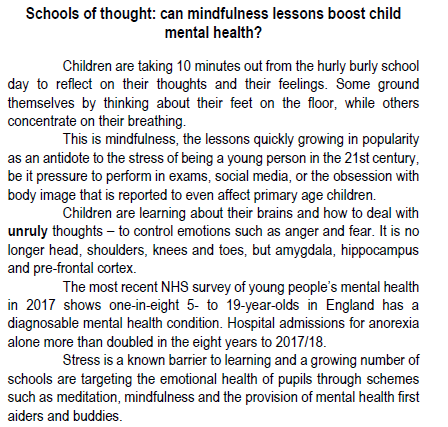
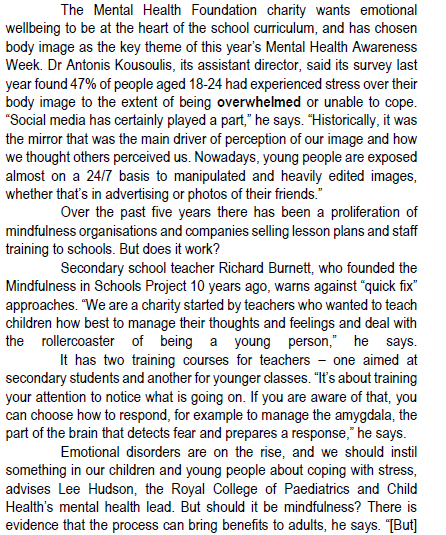

The word 'overwhelmed'' highlighted in paragraph 6 could be best replaced by
As far as lexical comprehension is concerned, mark the following item as right (C) or wrong (E).
In the fragment “They strain towards this objective” (lines 15 and 16), the underlined word is synonymous with “move”.
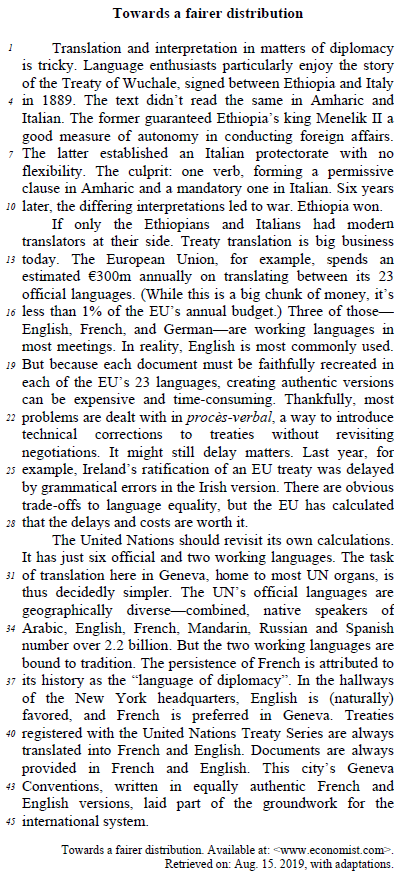
Considering the grammatical and semantic aspects of the text, mark the following item as right (C) or wrong (E).
In the passage “The United Nations should revisit its own calculations.” (line 29), the underlined word can be correctly replaced with reconsider.
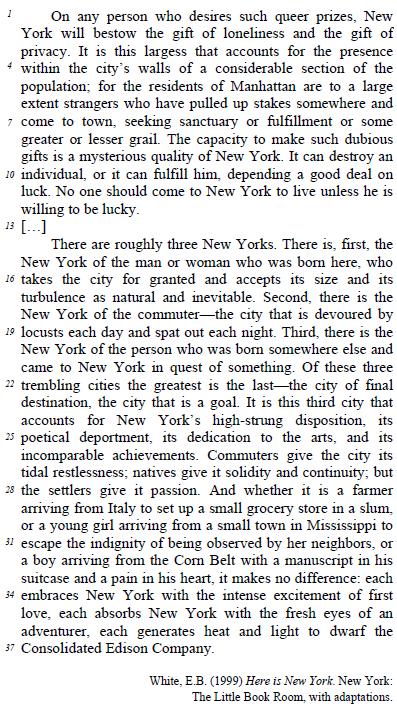
Considering the text, mark the following item as right (C) or wrong (E).
The word “bestow” (line 2) could be correctly replaced with exchange.
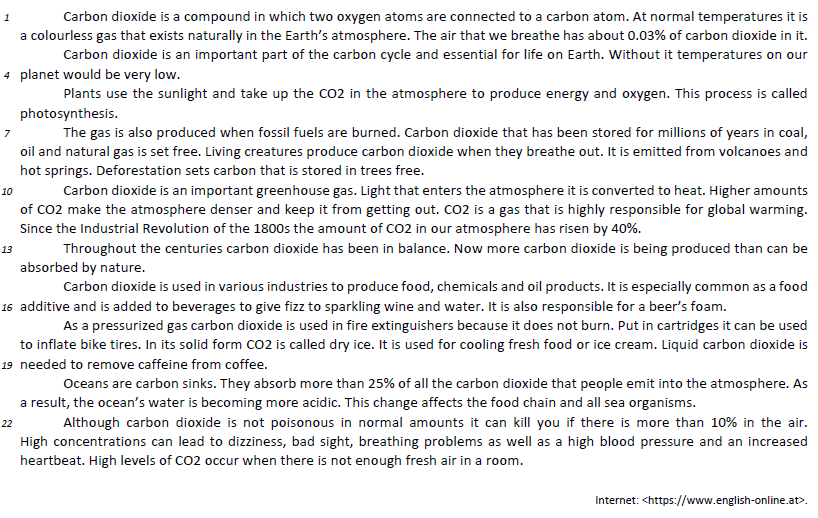
Based on the text, judge the following item
In the text, the word “Throughout” (line 13) can be correctly replaced by In all of.

Considering the ideas and the vocabulary in the text, mark the following item as right (C) or wrong (E).
In the second paragraph, the words “havoc” (line 16) and “ravages” (line 19) both mean “extensive or devastating destruction”.
As far as lexical comprehension is concerned, mark the following item as right (C) or wrong (E).
In the fragment “resolve on the other hand to impose a mass religion.” (lines 6 and 7), the underlined word means “alternative”.

Considering the text, mark the following item as right (C) or wrong (E).
The word “largess” (line 3) could be correctly replaced with generosity.

Based on the text, judge the following item
The word “amounts”, in “Higher amounts of CO2 make the atmosphere denser” (lines 10 and 11), can be replaced, without
changing its meaning, by nodes



